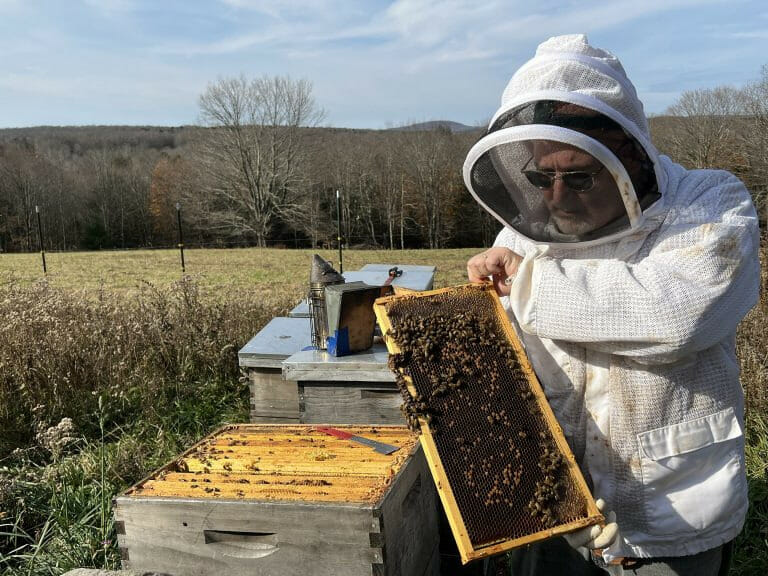Loch Sheldrake, NY— Setting the thermostat at 92 degrees this winter might sound a little extreme, but that’s exactly what will happen inside five honeybee hives in SUNY Sullivan’s apiary.

“Female worker bees will cluster in the center of the hive to keep the queen warm throughout the winter, at around 92 degrees,” said Economics Professor and campus beekeeper Art Riegal ’81. “A football-shaped cluster of honeybees will surround the middle 4-5 frames of each hive with the queen in the middle. The bees warm the cluster by vibrating their abdomen and wing muscles (disengaging their wings) using calories from consuming their honey reserves. Honeybees can heat their bodies up to 111 degrees Fahrenheit.”
Riegal, who teaches business courses for the Catskill Hospitality Institute at SUNY Sullivan, and Tofowa Pyle ’21, a student in the College’s Green Building Technology Program, recently spent several hours winterizing Sullivan’s hives to help protect and keep them healthy this winter. The work included wrapping the hives in roofing paper to help insulate them, placing insulation boards on top, and slightly tilting the hives to provide ventilation and prevent condensation from building up inside.
“Bees can survive cold. Bees can survive wet . . . Bees can’t survive cold and wet,” said Riegal, “It’s really important that you tilt your hive a little bit so the condensation rolls off and you’ve got some ventilation, so (air) can come up through and ventilate out in the wintertime and the balance of moisture in the hive does not overwhelm the bees and doesn’t turn into ice crystals and kill them.”
SUNY Sullivan’s apiary has five active hives and was established in 2017 by Riegal with support and guidance from the College’s Sustainability Committee. Highlighting the College’s commitment to environmental sustainability and education, the apiary serves as a growing center for apiculture education on campus, supplies honey to the College’s new food pantry and the Culinary Arts Program, and provides the nearby Hope Farm and the SUNY Sullivan Community Garden with a thriving community of pollinators.
“If you have agriculture, you need pollinators,” said Riegal, who has his own hives and honey business, Covered Bridge Honey LLC in Livingston Manor, and viewed creating the College’s apiary as an opportunity to experiment and educate. “I wanted to experiment with different sub-species of apis mellifera (honeybee) as well as organic treatment methods without worrying about honey production. Currently, there are three types of bees in the apiary: Saskatraz, Italian, and Carniolan. Eventually, I hope to have bees that are able to withstand the varroa destructor mite which is the
bane of every beekeeper now.”
Instructional Assistant and Community Garden Coordinator Kathryn Scullion said that having an apiary in close proximity to the SUNY Sullivan Community Garden and Hope Farm has practical and educational benefits.
“Pollinators are essential to the success of many of the food crops we grow in the SUNY Sullivan Community Garden and on Hope Farm,” said Scullion, who is also a member of the College’s Sustainability Committee. “At the same time, the farm and garden support pollinators of all kinds—honeybees as well as native bees, wasps, beetles, butterflies, moths, hummingbirds—by planting a wide variety of food, flowers, and herbs, and growing them without the use of pesticides. Having a healthy diversity of plants and pollinators is one of the fundamental goals of sustainable
agriculture.”
Pyle, who has a BA in sustainable agriculture from Sterling College in Vermont and has worked with hives before, said working with Riegal has given him new insights into beekeeping.
“It’s really valuable to learn from someone who has so many experiences working with bees,” said Pyle, who was especially interested to learn how double-folding the layer of roofing paper at the bottom of the hive, to add insulation, can encourage bees to consume their honey stores in the correct order, from the bottom up.
As part of their winterizing work, Riegal and Pyle also installed smaller access openings at the bottom of the hives, which will help keep mice out, continue to let condensation escape, and allow the bees to fly out for “cleansing flights,” on warmer days. Riegal said honeybees are very hygienic and defecate outside the hive, signs of which can sometimes be seen on snow in winter. Those bathroom trips, along with eating and working to keep the hive warm, mean that overwintering honeybees are not considered hibernators.
Another fact about overwintering hives is that no dudes (drones) are allowed. “Males are dragged out of the hive in the fall by the female worker bees since (males) only function as mates to a queen and do nothing else but consume food stores,” said Riegal, who said the queen will resume laying males again in the spring, usually in mid to late March. “By April, we have forage blooming (trees and early wildflowers) so the foraging bees can bring in pollen (protein) and nectar (carbs) to feed the new brood instead of eating more of their winter stores.”
Riegal, a 1981 graduate of SUNY Sullivan, said the apiary has plans to expand the number of hives in the apiary and that discussions are underway for the College to offer non-credit courses in beekeeping and apiculture in the near future.
To learn more about SUNY Sullivan’s apiary, follow @sunysullivanbees on Instagram or visit @sunysullybees on Facebook. For more information about SUNY Sullivan, visit sunysullivan.edu or contact admissions@sunysullivan.edu.
About SUNY Sullivan
SUNY Sullivan is the leader of innovative higher education and a catalyst for workforce development throughout the Sullivan Catskills and beyond. Our diverse community cultivates personal growth and professional advancement, preparing students for success in a sustainable and interconnected world. A forward-looking, top-tier community college in New York, SUNY Sullivan offers over 40 degree programs, certificates, and micro-credentials for learners at all levels of their educational goals. We value critical inquiry and creativity while supporting our students in a culture of inclusion and respect.
